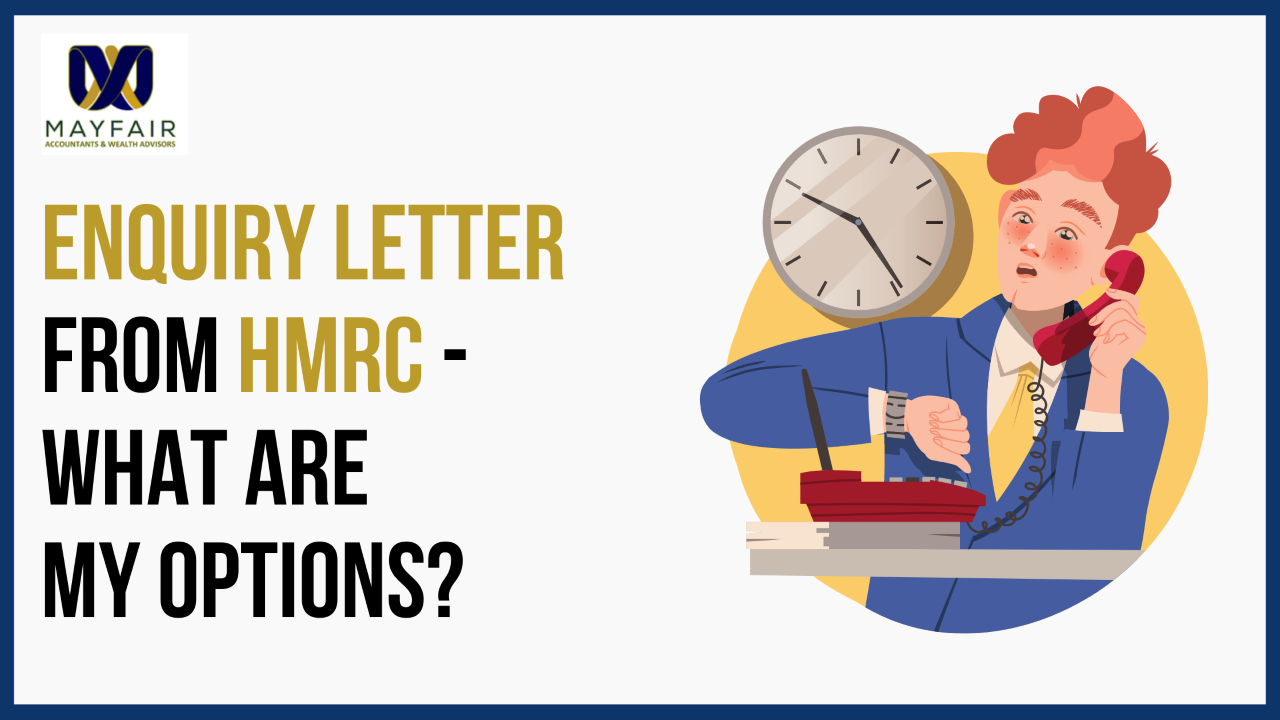If you have received an enquiry letter from HMRC, you may be wondering what your options are. In this article, we will outline the different courses of action you can take and provide some guidance on how to proceed.
The first step is to read the letter carefully and identify which issue or issues HMRC is questioning. The letter will also state what evidence HMRC requires in order to make a decision. Once you have gathered all the relevant information, you can then decide on the best course of action to take.
One option is to reply to the letter directly, providing the requested evidence along with your response. However, this may not be advisable if you are unsure about what evidence to provide or how to respond to the enquiry. In this case, it may be better to seek professional advice from an accountant or tax specialist.
Another option is to agree to a meeting with HMRC to discuss the enquiry. This can be helpful if you want to clarify any points or need help gathering evidence. However, you should be aware that HMRC has the power to issue a decision based on the information it gathers at the meeting, so it is important to have all the relevant documents and information ready.
Finally, you may decide to dispute HMRC’s findings. If you believe that HMRC has made a mistake, you can submit a formal appeal. This process can be complex, so it is advisable to seek professional advice if you choose this option.
How to survive an enquiry by HMRC:
No one wants to receive an enquiry letter from HMRC, but if you do, it is important to take the appropriate steps to protect your interests. By understanding your options and seeking professional advice, you can make the process as smooth as possible.
What happens at the start of an enquiry?
When HM Revenue and Customs (HMRC) want to make a decision about your tax affairs, they will send you an enquiry letter. This letter will include all the necessary information about why they are making the enquiry, what evidence is required for them to make a decision and details of how you can reply. It is essential that you read this letter carefully because there are several different options open to you depending on the circumstances surrounding the enquiry.
What happens if I receive an enquiry?
First of all, it is important not to panic. Although receiving an enquiry from HMRC may be intimidating, it is simply their way of gathering information in order to make a final decision. If you know that your tax affairs are in order, you should have nothing to fear. However, if there is anything about your tax affairs that HMRC questions, it may be necessary to take action in order to protect your interests.
What are my options when I receive an enquiry letter?
There are several different courses of action that could be taken when you receive an enquiry letter from HMRC. You may wish to reply directly by providing the requested information and submitting any relevant documents along with your response. It may also be advisable to arrange a meeting with HMRC to discuss the issue so that any doubts can be clarified or evidence gathered. Alternatively, you may want to submit an appeal because you believe there has been some mistake on HMRC’s part. Each of these options is described in more detail below.
- Reply directly to HMRC
If you decide to reply directly to HMRC, it is important to include all the requested information and documents. It is also important to respond within the given timeframe, which will be included in the enquiry letter. This option should only be considered if you are confident that your tax affairs are in order and you have nothing to hide. If HMRC has any doubts after reviewing your response, they may choose to investigate further, which could lead to a more serious investigation and increased penalties.
- Meeting with HMRC
A meeting with HMRC can be helpful if you want to clarify any points or need help gathering evidence. However, you should be aware that HMRC has the power to issue a decision based on the information it gathers at the meeting, so it is important to have all relevant documents and information ready.
- Appeal an enquiry
If you believe there has been some mistake on HMRC’s part, you can appeal against their findings. This process can be complex, so it is advisable to seek professional advice if you choose this option. If your appeal is successful, any penalties or interest charges will be canceled (provided that you submit your appeal within 30 days). However, even if you don’t submit an appeal within 30 days but decide later on to do so, any penalties and interest charges incurred up until then will not be affected by the appeal.
- Seek professional advice
If you are unsure of what to do next or would like help gathering evidence, seeking professional advice can be a sensible option. A qualified accountant or solicitor will be able to guide you through the enquiry process and help protect your interests. As with any legal matter, it is important to seek specialist advice in order to avoid any potential problems.
When you receive an enquiry letter from HMRC, it is important to take the appropriate steps to protect your interests. By understanding your options and seeking professional advice, you can make the process as smooth as possible.
What happens at the start of an enquiry?
When HM Revenue and Customs HMRC wants to make a decision about a person’s tax affairs, it may send that person what is called an enquiry letter. This is not always the case but it happens often enough to cause concern for some people who receive it. The aim of this article is to set out what people can expect if they receive such a letter and to give them some idea of the steps they can take to protect their interests.
An enquiry letter will usually ask a taxpayer to provide information and documents relating to their tax affairs. It may also invite the taxpayer to a meeting with HMRC officials. The letter will set out a timeframe within which the taxpayer must reply. If they do not reply or if they reply but do not provide all the information that HMRC requests, then HMRC may begin to investigate the taxpayer’s tax affairs. This could lead to increased penalties and even criminal prosecution in serious cases.
What should I do if I receive an enquiry letter from HMRC?
If you receive an enquiry letter from HMRC, you should take the following steps:
1. Read the letter carefully and make sure you understand what it asks for. If you are unsure, ask someone else to help you or contact HMRC for clarification.
2. Make sure you have all the information and documents that HMRC requests ready.
3. Reply to HMRC within the timeframe set out in the letter.
4. If you need help gathering evidence or want to discuss your case with HMRC, you can arrange a meeting.
5. If you believe there has been some mistake on HMRC’s part, you can appeal against their findings.
6. Seek professional advice if you are unsure of what to do next or would like help gathering evidence.
Taking these steps will put you in a better position to deal with an enquiry from HMRC and protect your interests. However, it is important to note that this is not an exhaustive list and that people should seek professional advice if they have any specific concerns.
What are the consequences of not responding to an enquiry letter from HMRC?
If a taxpayer does not respond to an enquiry letter from HMRC or if they reply but do not provide all the information that HMRC requests, then HMRC may begin to investigate the taxpayer’s tax affairs. This could lead to increased penalties and even criminal prosecution in serious cases.
It is therefore important for taxpayers to take their enquiry letter seriously and to respond promptly and fully to any requests from HMRC.
What can I do if I disagree with HMRC’s findings?
If a taxpayer disagrees with HMRC’s findings, they can appeal against their decision. This must be done within 30 days of receiving the decision notice from HMRC. The appeal will be considered by an independent tribunal which will make a binding decision. Seek professional advice if you would like help preparing an appeal or if you have any other concerns.
Need further help?
If you are unsure how this process works, or if you have any concerns about what your company’s future is likely to be, don’t hesitate to get in touch with the team today on +44 (0) 20 7060 5015 or email us @info@mayfairwealthadvisors.co.uk



